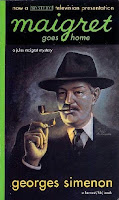 Georges Simenon
Georges Simenon "A great writer"
son of an accountant and a clerk in dry goods, Simenon was born in 1903. Fifteen years, he left school after professional debut hesitant (baker, bookstore clerk) in Liege, his hometown - he was sixteen when he returns the Gazette de Liège " . He stayed three years, will take care of a daily ticket which was entitled "out of the house" and he signed has Lecoq, for the day nal wishes not to take responsibility. Indeed, Simenon was not quite the color of the paper, it to say: Catholic and conservative Eur. This position will allow him to see through all the classes s OCIAL : the ultimate experience for a future novelist.
In 1922, he fai
Soon S
 imeno n tries to write as much as possible, with concrete words ts. That is probably why his books are translated in the world, in almost a hundred languages and reaches ant over half a billion books sold. He wants character s "true", which tells nt not their feelings, but act and which we see the actions. Characters with their cracks and faults in their daily lives, dare to go after themselves.
imeno n tries to write as much as possible, with concrete words ts. That is probably why his books are translated in the world, in almost a hundred languages and reaches ant over half a billion books sold. He wants character s "true", which tells nt not their feelings, but act and which we see the actions. Characters with their cracks and faults in their daily lives, dare to go after themselves. "From my fifteen or sixteen, I was curious about the man and the difference between man" h abillé "and man" naked. "The man he is itself and the man as he appears in p ublic . George Simen it.
February 20
 1931, the Paris publisher Fayard Arthème organizing a major literary man Theatre Education Committee, where he invites all Paris at the time. His goal: to launch a new fictional character "Jules Maigret" as twenty years ago, he had propelled "Fantomas". The author called
1931, the Paris publisher Fayard Arthème organizing a major literary man Theatre Education Committee, where he invites all Paris at the time. His goal: to launch a new fictional character "Jules Maigret" as twenty years ago, he had propelled "Fantomas". The author called e Georges Simenon, he was twenty-eight years is unknown, but q ui has already released: 187 popular novels signed by 22 aliases. Maigret appears for the first time in re "Pietr Latvian," a novel published in 1931.
Maigret who opened the "gates of the literature", he began a series of novels p SYCHOLOGY as "Betrothal of Mr. Hire" (1933) and "canal house" (1933), he will describe as "hard novels" or "novels of destiny". From 1945 to 1955, he moved to the United States where he set several of his novels, including "Three ch ambers M anhattan" (1947), "Maigret in New York" (1947) or "L watchmaker Everton "(1954). Back in Europe, he settled permanently in Switzerland and abandons the novel in 1972. Deeply shocked by the death of his daughter Marie-Jo, he took the pen in 1980 to write his "Intimate Memoirs," before shutting himself until his death in 1989, in the silence.
"Writing in joy, what nonsense! Roman finished, I go in life. George Simen it.
Success u niv
 Ersel Maigret (cycle includes 75 novels) has unfortunately somewhat overshadowed the rest of his ow WORKING (117 r Omen hard "). It should be noted, still a few peaks, among others: "The eldest Ferchaux" (1945), "The snow was dirty" (1948) and "Ghosts of the Hatter" (1949). A work that much - Celine Cocteau and Gide Mac Orlan stand as one of the most important of the twentieth century, and includes in the same fervor, amate urs of thrillers and general literature. Having narrowly missed the Nobel Prize for Literature , Georges Simenon is entered in the prestigious Pleiade, a just recognition for the Francophone writer, like an Agatha Christie saw his fame to go around the world .
Ersel Maigret (cycle includes 75 novels) has unfortunately somewhat overshadowed the rest of his ow WORKING (117 r Omen hard "). It should be noted, still a few peaks, among others: "The eldest Ferchaux" (1945), "The snow was dirty" (1948) and "Ghosts of the Hatter" (1949). A work that much - Celine Cocteau and Gide Mac Orlan stand as one of the most important of the twentieth century, and includes in the same fervor, amate urs of thrillers and general literature. Having narrowly missed the Nobel Prize for Literature , Georges Simenon is entered in the prestigious Pleiade, a just recognition for the Francophone writer, like an Agatha Christie saw his fame to go around the world . Raised in u
 do guesthouse during his youth when there were almost as e Russian students. Simenon began with Russian literature before even know the literature French. Gogol, Chekhov, Pushkin, Dostoevsky, Balzac and Flaubert before Gorky. Then he developed a passion for writers like Dickens and Conrad. And good student, does he want to clarify, he had seriously studied the classics. Asked by a reporter who asked him, what is your favorite writer? Simenon said this: The greatest writer of the nineteenth century, I say Gogol. The greatest writer of the twentieth century: Faulkner.
do guesthouse during his youth when there were almost as e Russian students. Simenon began with Russian literature before even know the literature French. Gogol, Chekhov, Pushkin, Dostoevsky, Balzac and Flaubert before Gorky. Then he developed a passion for writers like Dickens and Conrad. And good student, does he want to clarify, he had seriously studied the classics. Asked by a reporter who asked him, what is your favorite writer? Simenon said this: The greatest writer of the nineteenth century, I say Gogol. The greatest writer of the twentieth century: Faulkner.
0 comments:
Post a Comment